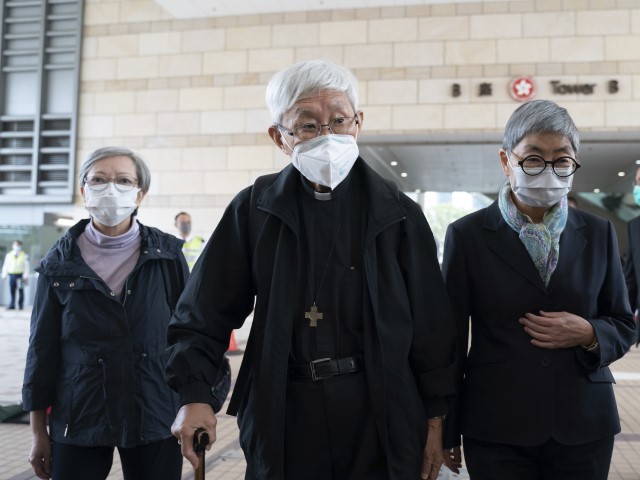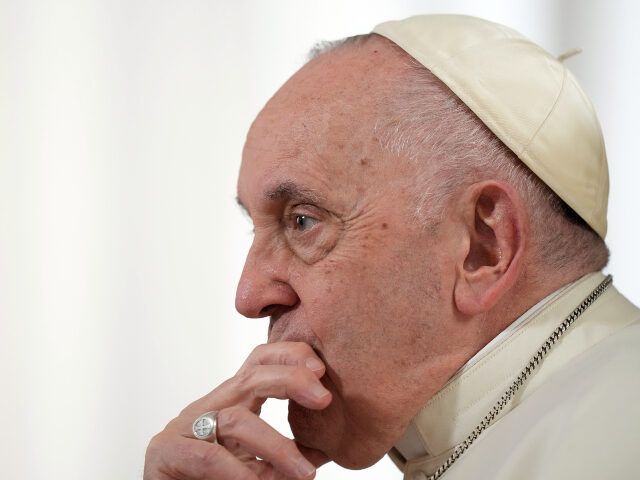ROME — Pope Francis celebrates the tenth anniversary of his election Monday amidst growing concern for the enduring legacy of his pontificate.
The election of Jorge Bergoglio to the throne of Peter on March 13, 2013, was surrounded by an enormous sense of expectation. Here was the first pontiff from the New World, the first Jesuit pope, and a promised reformer of Vatican finances and bureaucracy.
He spoke simply, urged greater attention to the poor, appeared to welcome criticism, and preached mercy to a sinful world.
Yet according to a Washington Post Sunday op-ed, that “sense of possibility has diminished, replaced by greater discontent.”
“Conservative opposition has intensified,” it continues. “Just as important, Francis has also faced criticism from the church’s left, a flank led by Germany, where some leaders say he hasn’t gone far enough in remaking an institution in crisis.”
The concerns of many observers both on the left and the right are the glaring inconsistencies that seem to characterize this paradoxical pontificate.
The pope’s endless off-the-cuff comments and in-flight interviews have blurred the line between official magisterial declarations and mere unreflective papal spitballing, leaving many wondering how seriously they are to take the pope’s verbal musings. These unedited comments have also resulted in fairly frequent unintended offense, such as when Francis called women theologians “the strawberries on the cake,” when he told large families they needn’t “breed like rabbits,” or when he asserted that the “cruelest” soldiers in Ukraine are not ethnic Russians but outsiders like “the Chechens” and “the Buryati” who fight on the Russian side.
Another serious point of contention has been the pope’s politics in appointing cardinals. Preaching diversity, he has instead homogenized the college of cardinals, only elevating prelates who share his particular pastoral proclivities. Gone are the days when popes welcomed pushback and alternative points of view. As one commentator wrote recently, unlike Popes John Paul or Benedict, Francis “is often at war with postconciliar pluralism,” which allows him to only to appoint men “clearly allied with his program.”
Ironically, while calling for a “synodal” approach to church where greater listening is meant to involve the people of God in decision-making, Francis has proven to be the most autocratic of any pope in recent history. He has notably stripped local bishops of their autonomous decision-making power, for example in allowing the celebration of the traditional Latin Mass, recentralizing all authority in Rome. In his practical rejection of Vatican II’s call to greater collegiality, Francis has shown himself a throwback to the days of the “Papa Rex,” a monarchical pontiff.
As an anti-intellectual, Pope Francis has downplayed the importance of doctrine and theological insight, insisting instead on the importance of pastoral leadership. This has been accompanied by a shift in emphasis from questions of salvation and moral absolutes to social issues that garner wide popular support from outside church walls. As the Washington Post declared, Francis has made “pillars out of issues such as migration and the environment,” in which he overlaps with the United Nations and other multinational organizations.
In recent years, Francis has angered both progressives and conservatives by his unwillingness to call out China for its egregious violations of human rights. Last October, the editors of the Wall Street Journal published a scathing indictment of the pope, declaring that he had undermined the Church’s moral authority by pandering to the Chinese Communist Party (CCP).
The chief fruit of the Vatican’s secret agreement with the CCP on the appointment of bishops in the country has been “to mute Vatican criticism of human-rights abuses,” the editors stated in their op-ed, “from the genocide of the Muslim Uyghurs to the political prosecution of Cardinal Joseph Zen in Hong Kong.”

From left, former lawmaker Cyd Ho, Cardinal Joseph Zen, and barrister Margaret Ng walk out of the West Kowloon Magistrates’ Courts after the verdict session in Hong Kong, Friday November 25, 2022. Zen and five others in Hong Kong were fined after being found guilty Friday of failing to register a now-defunct fund that aimed to help people arrested in the widespread protests three years ago. (Anthony Kwan/AP)
Pope Francis, “who is so critical of the U.S. and capitalism, is silent on China,” the essay contended. “This is a return to the Vatican’s failed Ostpolitik of the 1960s and 1970s, when Rome muted criticism of the Soviet Union and its East European satellites.”
Indeed, during his ten years as pope, Francis has carefully avoided doing or saying anything that could be construed as criticism of Chinese leadership, including the CCP’s crackdown on Christian churches, its brutal suppression of Hong Kong’s pro-democracy movement, and its horrific genocide of Muslim Uyghurs in the Xinjiang region.
On Monday morning, Pope Francis concelebrated Mass with all of the cardinals present in Rome to mark his tenth anniversary as pope, and the Vatican newspaper L’Osservatore Romano published a series of articles lauding Francis as the pope of synodality, the pope of mercy, the pope of peace, and the pope of “missionary zeal.”
In a recent reflection on Francis’ ten years as pope, veteran Vatican reporter John L. Allen, Jr. compared Francis to Mikhail Gorbachev, who in the name of glasnost and perestroika, wound up destroying the very entity that he intended to reform. In the case of the Catholic Church, God himself may have something to say about that, but one need not bring down the entire edifice to effect structural damage.
When the smoke clears, the jury is still out on the long-term fruitfulness of the Francis papacy, and his historical legacy has yet to be determined. In the eyes of many, however, the points of concern seem to be multiplying at a dizzying rate.

COMMENTS
Please let us know if you're having issues with commenting.